Oldham Athletic: How Joe Royle's 'people's champions' came close to a treble, but ended up with nothing
- Published
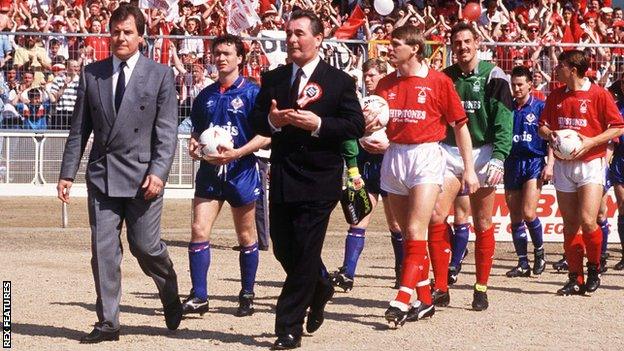
Joe Royle (left) took his Oldham Athletic side all the way to Wembley in the 1990 League Cup
"Here they are, look, it's the people's champions," Nottingham Forest captain Stuart Pearce sneered as Oldham Athletic trooped out for a six-a-side exhibition game against Baltimore Blast during the 'Soccer Sixes' at Manchester's G-Mex Arena in December 1990.
Pearce's jibe may have stung a bit, but 30 years ago the Latics were an entertaining gang of players from the Second Division that rose up to bloody the noses of the elite.
In 1989-90, under the management of former Everton forward Joe Royle, the boys from Boundary Park were going for a unique treble - promotion to the top flight, the FA Cup and League Cup - and despite coming close on all fronts, ended up with nothing.
Royle and full-back Andy Barlow look back on a season of glorious heartbreak.
Putting the pieces in the jigsaw
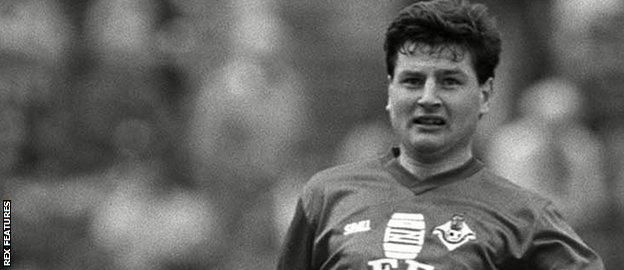
Denis Irwin was signed from Leeds, one of many players acquired from Oldham's bigger local rivals
Royle had done well since taking over in 1982, despite off-field financial issues threatening to derail their progress.
He guided Oldham to third place and a play-off defeat by Leeds in 1986-87, after which players including Andy Goram and Andy Linighan departed, and subtle tweaks were essential.
Earl Barrett, Denis Irwin, Rick Holden and Neil Adams would all come to prominence, while homegrowns Nick Henry and Barlow showed they could mix it with seasoned pros like Roger Palmer and Andy Ritchie.
Joe Royle: "Our recruitment was good. We had Jim Cassell and myself scouting, and we scouted Manchester United, City, Liverpool, Everton and Leeds. We knew as much about their reserve players as they did.
"Over the 12 years at Oldham we made a transfer profit most years. We got it right. We knew all about the City kids, and took Paul Warhurst and Barrett; we knew about Leeds, so got Ritchie and Irwin, two great buys. And we took Adams and Ian Marshall from Everton."
Andy Barlow: "Joe got a bit of luck really that we all got on, but I think he was building that team.
"He was in a period of having to buy and sell and his market was to find bargains who he thought were a bit unloved and perhaps with some TLC we can do something with it."
Fantastic on plastic... and grass
Oldham's home record was a key strength in their promotion bid as well as their cup runs. Between January 1989 and March 1990, the Latics didn't lose a single home game, with champions Arsenal, Aston Villa, Everton and Southampton all tumbling to defeat at an increasingly packed-out Boundary Park.
The laying of a plastic pitch in 1986 had helped with Oldham's flowing style of football, which they were able to transfer to grass. Visiting clubs were not so adaptable.
Royle: "We were very good on the plastic, but we bought players we knew could handle the ball. They were all players who were comfortable on the ball and we were good at home."
Barlow: "Teams would be going out to warm up and they'd be taking three different types of footwear out. I used to think, why don't the players on the opposition look at what we've got on and wear the same things?
"They'd come out with training shoes, Astroturf trainers, rubber mouldies. I've seen people with actual studs taken out and replaced with the old rubber stud, which you could put on for using on ice, which were absolutely useless.
"Half the time I think the game was lost mentally before they started."
Beating the big boys 'grew belief'
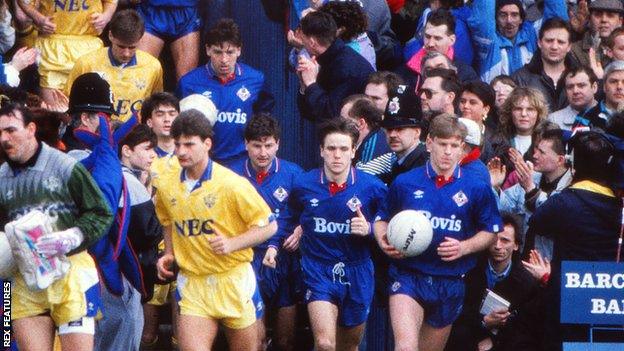
Big-match occasions became regular occurrences for Oldham fans during Royle's time as boss
While Oldham's league campaign chugged along, with the club in the play-off places for much of it, the cup competitions were certainly no distraction.
In the League Cup, promotion rivals Leeds were beaten home and away in the first round, Scarborough were smashed 7-0, with Frankie Bunn grabbing a club-record six goals, and that brought Arsenal to town with a quarter-final place at stake.
Two goals from top scorer Ritchie and a piledriver from Henry - his first senior goal - helped secure a 3-1 win under the lights and caught the attention of the footballing public.
Barlow: "You're looking at the Arsenal team going, 'Wow'. But, southerners coming north on a cold night, the wind might be blowing, the rain might be coming down, they'll hate it. They'll get to Birmingham and be way out of their depth by the time they get there, never mind Oldham.
"I was marking David Rocastle, Alan Smith was up front for them. One of their players turns round in midfield and says: 'Oi, come on lads, we're on TV here, let's make a bit of a show of it.'
"I started laughing, I looked at him and said: 'You're losing, you've not had the ball for 50 minutes.' That was the sort of mentality they had. They'd think it's only little old Oldham but then: 'Hang on a minute, we're in a game here'. Before they knew it, the game was beyond them."
Willie's impact
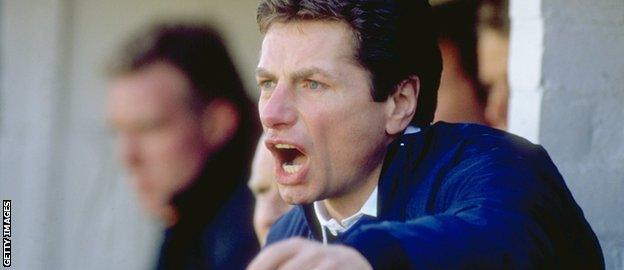
Willie Donachie played more than 350 games for Manchester City and won 35 caps for Scotland
While Joe Royle led the operation, his right-hand man was former Manchester City team-mate Willie Donachie, who made sure they were fit, something badly needed in a gruelling 65-game season.
Both were disciples of flamboyant Malcolm Allison. Novel training sessions were routine in the pursuit of excellence.
Barlow: "You've got two guys doing revolutionary things for English football at the time. Willie had played in America, saw different things and came back with them.
"I've stood around the centre circle at Oldham doing meditation. Willie was into things like that, he was already doing yoga on his own and trying to get it into us in terms of our stretching.
"The club doctor's wife was doing fitness and gym classes, and we did aerobics with her. We'd go to a class with a woman with a leotard on and a gym slip. You can imagine the lads, she was like a model. Ian Marshall would be grumbling, but it didn't do him any harm in his career."
Running Manchester United to the wire
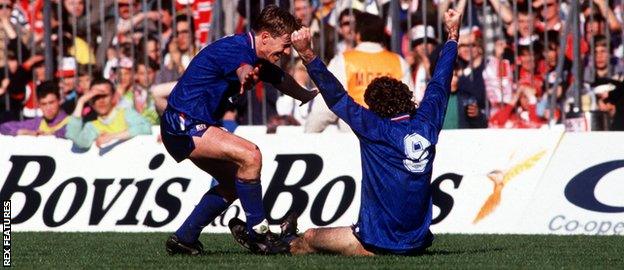
Oldham's display in their semi-final draw with Manchester United won them plenty of admirers
As winter turned to spring in 1990, everyone knew what Oldham were about. They added Southampton and West Ham to their list of scalps to reach the League Cup final, and also saw off Everton and Aston Villa in the FA Cup.
Next up were Manchester United, at Maine Road in a last-four derby, with the Latics just 90 minutes from a second Wembley appearance.
The semi-final produced an absorbing 3-3 draw on the Sunday, so Royle's side hauled their weary limbs back three days later, only to lose 2-1, cruelly, in extra time.
Royle: "There we were, 'little' Oldham going toe-to-toe with United, and the 3-3 draw was hard on us, we should have won the game.
"When people asked if I expected to win, I said I wanted a performance from us for people to look at and say what a good side. We played so well."
Barlow: "United respected us as much as we did them. It was a huge derby against one of the biggest clubs in the world, but they didn't hold any fears because they weren't pulling up any trees.
"They were probably as fearful as us, not so much individually, but as a team because we were arriving with confidence."
Bittersweet trip to Wembley
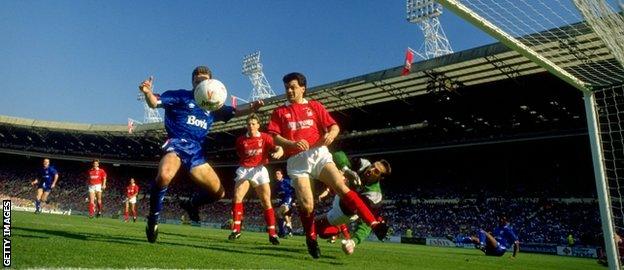
Oldham were denied by some impressive goalkeeping by Steve Sutton in an absorbing final against Forest
Just 18 days after their FA Cup defeat, Oldham made their first visit to Wembley in 95 years of club history for the League Cup final against Brian Clough's Forest.
It would be their 61st game of the season and thousands of Latics fans headed down the M6 in anticipation.
Under blistering sunshine, Oldham suffered their second major disappointment of the season, as Nigel Jemson's goal early in the second half gave Forest a 1-0 win.
It was, as TV commentator Brian Moore said: "Enough to stifle the dreams and the hopes of a splendid Second Division club."
Barlow: "I was at Forest as a schoolboy, I was released from there 1981-82, when Clough was manager. When I got to that game, I felt like I had a point to prove, I wanted to show them they had made a big mistake.
"Joe Royle's son Darren ended up working at Pro-Zone [analysis software company for football] and ran that final through the software. He said: 'Wow, you want to see the stats, we absolutely battered them on every count'. We just couldn't get the goal.
"It was a big disappointment, it was the first time I'd been in a dressing room with Oldham all season where it was seriously, seriously deflated.
"Everyone was in a daze, Joe was trying to go round and pick people up and lift them because at that point we still had a good chance of going up. The problem was, the games were stacked against us, and we had to play a game every two days."
Burnout and burning pride
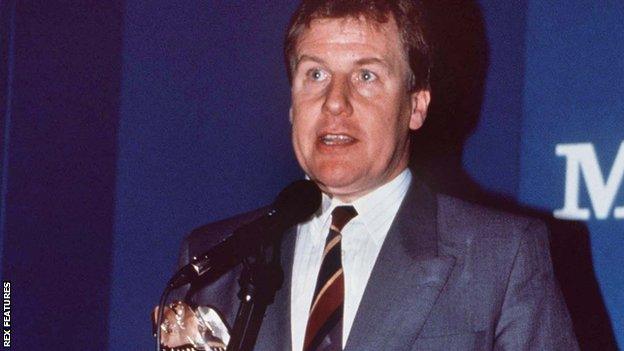
Royle was awarded manager of the year in 1991
The odds were against Oldham in their bid for promotion. All those cup games, including five replays, had finally taken their toll.
The League Cup final was played on 29 April. Between then and 7 May - the last game of the season against Bradford - Oldham played another four games. They missed out on a play-off spot by three points.
Royle retained much of the personnel and, without the cup heroics, they came back the following season to win promotion to the First Division as champions.
Barlow: "It was a game every two days. I played centre-back at Sunderland and centre-back at Bradford. We were all out on our feet. My legs had gone, I had nothing left in them at all.
"We played 65 games and won nothing. There was a desire to put that right from a core group of players who really drove things."